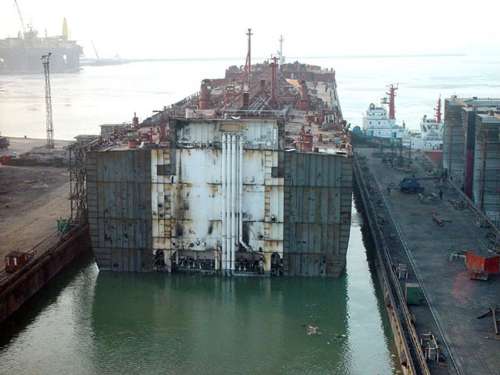Why owners must embrace sustainable ship recycling

Dr Anil Sharma, president and CEO of GMS, the world’s largest cash buyer of ships, writes exclusively for Splash.
Ship recycling plays a vital role in the lifecycle of a ship, as it is fundamental to the progression of the industry and shipbuilding. GMS, as the world’s largest cash buyer of ships for recycling and offshore structures, is committed to pioneering sustainability within the ship and maritime recycling field.
In recent months, the first yards in India have been certified as compliant with the Hong Kong International Convention for the Safe and Environmentally Sound Recycling of Ships (HKC). Although it is yet to be formally ratified, the standards within the HKC are making strong headway towards changing the industry, and is enabling achievable, sustainable goals for ship recycling. By looking at the yards who are preparing in advance of the regulation, and are already HKC compliant, we can see the positive impact from what can, and must, be achieved in all yards. Indeed the yards themselves are beginning to realise that previous practices are no longer socially or environmentally acceptable, or economically prudent, and the world will be holding them accountable for their out dated procedures.
GMS has a partnerships with leading HKC-ceritified yards in Asia, and we are seeing significant growth in demand for this service, which demonstrates that compliant yards are reaping the commercial benefits. This is the case across the industry, not just for South Asia, and this globally recognised standard must be supported and given the chance to achieve its potential, and change yards around the world for the better.
Many people rely on this vital industry, both directly and indirectly, and recycling is something that all ships will one day face; the stigma attached to it needs to be challenged in the face of vast and ongoing improvements. The focus needs to be on the positive changes and progress being made thanks to the HKC, and those that are driving it forward in the major recycling regions.
The demand for responsible ship recycling seems to now exceed supply, particularly in South Asia where most of the world’s ship recycling takes place. As these yards see growth for their services based on good health, safety and environmental practices, other yards compete for poorer quality ships at high prices. This has forced other, non-compliant yards to consider HKC compliance and ISO and OSHSAS certification to boost their businesses.
Making good CSR and sustainable ship recycling a fundamental demand from owners is starting to deliver change, and we will see this even more as the HKC comes into force. But if the demand peters out due to poor EU regulation deeming all beach recycling ‘dirty’, the incentive to improve these yards will also disappear.
The industry as a whole needs to support the compliant yards, those working towards compliance, and the HKC itself, to help foster this continued improvement. That means that shipowners need to take advantage of sustainable recycling services and make sustainable recycling the norm across the industry, rather than the exception.
